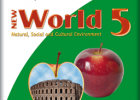Plant reproduction
In this unit we are going to learn about how flowering and non-flowering plants reproduce. The reproductive organs of most plants are in the flowers. It is in this part of the plant that the two reproductive processes occur: pollination and fertilisation. After fertilisation, the flowers develop into fruit, containing seeds. These seeds germinate and grow gradually into a new plant.
Esta secuencia contiene:
-
9 actividades
-
68 recursos
-
Idioma:
- Inglés
-
Formato:
Interactivo
Secuencia didáctica
-
Didactic objectives Observe flowers and identify their parts. Recognise and distinguish between the protective and reproductive parts of a flower. Explain how a flower works. Compare different types of pollination. [...]
-
1. Reproduction in flowering plants Most flowering plants reproduce sexually. Their sexual organs are in the flowers. [...]
-
In this unit we are going to learn about how flowering and non-flowering plants reproduce. The reproductive organs of most plants are in the flowers. [...]
-
Some plant species reproduce asexually, but most plants reproduce sexually. A pollen grain fertilises the egg cell inside the ovule. The sexual organs of spermatophytes (flowering plants) are in the flowers. [...]
-
Pollination Sexual reproduction in plants occurs when a spermatozoid meets an ovule. For this to happen, the pollen grains need to travel from the stamens to the pistil. This process of transferring pollen grains is called pollination. [...]
-
The fruit As a seed develops, the pistil changes and grows, the petals fall off, and it becomes a fruit. Fruits have many different forms: Some are fleshy like peaches, pears and oranges. [...]
-
Asexual reproduction in flowering plants Some flowering plants can produce descendents from a single parent plant without the help of another individual. This type of reproduction is called asexual reproduction. [...]
-
In this unit we are going to learn about how flowering and non-flowering plants reproduce. The reproductive organs of most plants are in the flowers. [...]
-
In this unit we are going to learn about how flowering and non-flowering plants reproduce. The reproductive organs of most plants are in the flowers. [...]
Cursos y asignaturas
-
10 años:
- Biología
- Sociología
-
11 años:
- Biología
- Sociología
-
Aún no hay comentarios, ¡comparte tu opinión! Inicia sesión o Únete a Tiching para poder comentar
La licencia digital es una autorización que permite utilizar un recurso digital de acuerdo con las condiciones legales de dicho recurso. El código que recibas una vez la hayas comprado te permitirá acceder al recurso educativo digital elegido.
Puedes consultar más información en nuestra página de ayuda.











































































¿Dónde quieres compartirlo?
¿Quieres copiar el enlace?